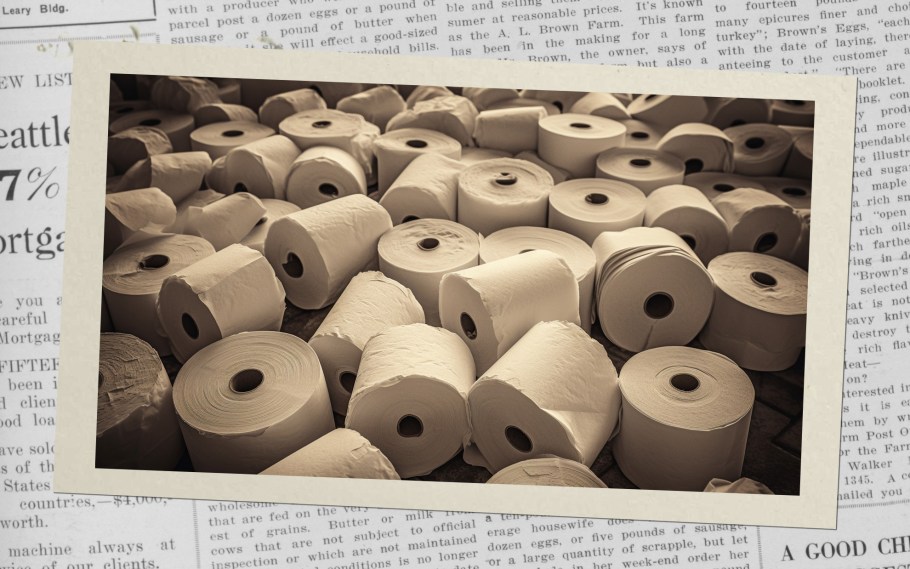Four of the most popular toilet paper brands — including Charmin and Seventh Generation — tested positive for per- and polyfluoroalkyl substances (otherwise known as PFAS, fluorinated toxic chemicals, or “forever” chemicals) according to a new report from Environmental Health News.
The agency, in partnership with the environmental wellness blog Mamavation, tested 17 different toilet paper brands in an Environmental Protection Agency (EPA)-certified lab and found PFAS in four popular waste paper products. PFAS, otherwise known as “forever” chemicals, build up in the body and never break down, and may cause cancer, birth defects, and infertility.
Charmin Ultra Soft Toilet Paper, Seventh Generation 100% Recycled Bath Tissue, Tushy Bamboo Toilet Paper, and Who Gives a Crap Bamboo Toilet Paper all contained levels of fluorine ranging from 10 parts per million (ppm) to 35 ppm. For context, guidelines released by the EPA in 2022 noted that levels as low as 0.004-0.02 ppt can cause adverse health effects.
The PFAS levels in these toilet paper products are low, so replacing them with another brand in your bathroom will do some good, but not a lot. The degree of exposure through the skin is mild compared to, say, in drinking water, which contains PFAS in all 50 states according to an EPA report released in 2022. The chemicals have been found in everything from tap water to nonstick cooking products, so limiting overall exposure is key.
Numerous studies conducted by the National Institute for Occupational Safety and Health (NIOSH) showed that PFAS can absorb through the skin, and a study conducted across schools of public health in the U.S. and Singapore linked them to fertility issues in women.
Can they also affect a man’s ability to conceive? Dr. Justin Houman, Director of Men’s Health at Towers Urology at Cedars-Sinai Medical Towers, explained to SPY that while this new report is concerning, data surrounding PFAS and fertility are limited.
“Research on the effects of PFAS on fertility is ongoing, and while the evidence is not yet fully conclusive, there are concerns regarding potential adverse effects,” said Houman. “Some studies suggest that exposure to high levels of PFAS might be associated with hormonal disruptions which can lead to reproductive system abnormalities. These effects could potentially lead to difficulties with conception and fertility issues.”
He also said many factors impact the degree to which PFAS are absorbed through the skin. “The degree of absorption may vary depending on factors such as the specific PFAS compound, its concentration, and the duration of contact,” said Houman. The amount of time toilet paper is in contact with the skin is quite brief, and surface-level, compared to a piece of fish cooked on a nonstick pan sealed with toxic chemicals, for example.
He also said that toilet paper’s effect on men’s fertility is not an immediate concern.
“While toilet paper may contain trace amounts of PFAS due to its manufacturing process or certain additives, the levels are typically low and may not pose an immediate threat to fertility,” said Houman. “However, it’s crucial to be mindful of potential cumulative exposure to PFAS from multiple sources. As a precautionary measure, individuals concerned about PFAS exposure should opt for products that are certified as PFAS-free or seek alternatives without unnecessary chemical additives.”
The best way to avoid PFAS, based on the information that’s currently available, is to opt for something more eco-friendly and made with fewer chemicals. Bamboo toilet paper is a great alternative. The following options are what SPY editors recommend.
Betterway Bamboo Toilet Paper 3 PLY – Eco Friendly, Sustainable Toilet Tissue
Typically, toilet paper made out of eco-friendly materials like bamboo is stiff, thin, and not comfortable to use. Betterway’s toilet paper is designed with three layers and is designed not to irritate sensitive skin.
Repurpose 100% Bamboo Toilet Paper (3 Ply)
This toilet paper is made with FSC-certified bamboo that’s harvested responsibly, and since bamboo regrows in 3-4 months after it’s cut compared to the year plus it can take for a tree to grow, it’s much more sustainable. It also comes in waste-free packaging, making it an even more environmentally-friendly choice.
Cottonelle Ultra Clean Toilet Paper with Active CleaningRipples Texture, Strong Bath Tissue
Avoiding PFAS doesn’t have to mean using only recycled, eco-friendly toilet paper. Mamavation also tested Cottonelle’s products alongside the brands above and did not detect concerning levels of toxic chemicals. This soft, plush option comes with 24 mega rolls per pack (the equivalent of 132 regular rolls) and is septic-safe.
TUSHY Classic 3.0 Bidet Toilet Seat Attachment
Another option for avoiding PFAS in the bathroom is to cut out toilet paper entirely with a bidet. This 3.0 model from Tushy attaches directly to the toilet with no plumbing attachment required, and it has a self-cleaning nozzle that requires minimal maintenance.
Swapping products is a preventative step, but Houman said that any couples experiencing ongoing fertility issues should seek help from a reproductive specialist.

